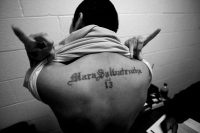
Cómo salir vivo de la MS-13
Ernesto Deras no puede explicar por qué se levantó de su asiento, se acercó al altar de una iglesia en el vecindario de Panorama City de Los Ángeles y comenzó a llorar descontroladamente.
“Perdón, perdón, perdón”, repetía el hombre que los demás pandilleros conocían como Satán, mientras se dejaba caer de rodillas.
“Me habían disparado, me había roto huesos, estuve en prisión”, me dijo este año, a casi dos décadas de que se acercó a Dios. Nada de eso lo había hecho llorar. “Me sentía como un hombre que no tenía lágrimas, pero aquel día ocurrió algo poderoso”.
Otros expandilleros narran historias similares.… Seguir leyendo »

